Are you planning to fly with your furry friend? Understanding JetBlue Airways’ pet policy is super important for a smooth travel experience and to make traveling with pets a joy and not a nightmare.
This guide will walk you through everything you need to know about flying with your pet on JetBlue.
Regardless of your experience level with pet travel, this guide will help you understand JetBlue’s rules and regulations.
Permitted Pet Types on JetBlue Flights
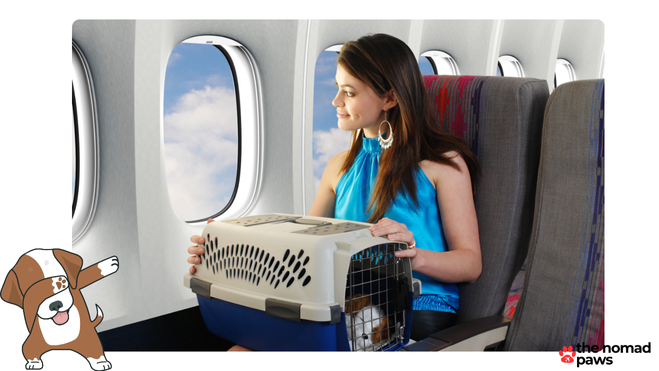
When it comes to flying with pets, JetBlue has specific rules about which animals are welcome aboard.
Let’s look at the details of what types of pets you can bring on your next JetBlue adventure. Make sure you read this carefully, because whether you can travel with a pet or not, will mostly depend on it.
Dogs and Cats
JetBlue’s pet policy primarily caters to our most common furry companions: dogs and cats.
These four-legged friends are allowed to travel in the cabin, provided they meet certain criteria. It’s important to note that JetBlue only allows small dogs and cats in the cabin, so your Great Dane might need to sit this flight out.
The airline is quite strict about this policy, so don’t try to sneak in your pet iguana or ferret.
Stick to dogs and cats, and you’ll be on the right track. Remember, airlines that allow dogs in cabin may have different policies, so it’s always good to compare if you’re considering other options.
Other Small Animals
While JetBlue’s pet policy focuses on dogs and cats, you might be wondering about other small animals.
Unfortunately, if you’re hoping to bring your guinea pig, rabbit, or any other small pet, you’re out of luck. JetBlue’s policy is clear: only dogs and cats are permitted.
This restriction is in place to ensure the comfort and safety of all passengers, as well as to comply with various regulations. So, if you have a different type of small pet, you might need to consider alternative travel arrangements or pet care options.
JetBlue Cabin Pet Weight Limit
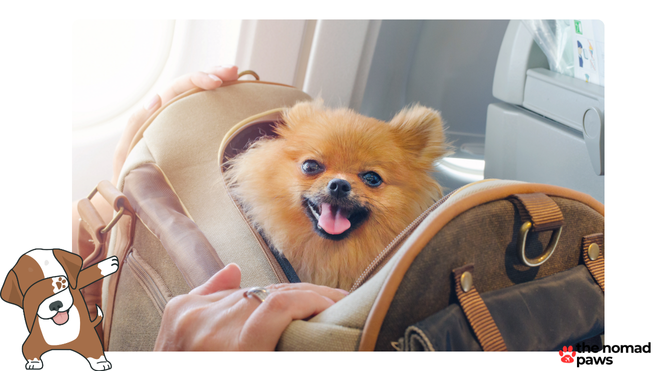
Weight is a crucial factor when it comes to flying with your pet on JetBlue. The airline has specific weight restrictions to ensure the safety and comfort of your pet, other passengers, and crew members.
Combined Weight Restrictions
JetBlue’s pet policy states that the combined weight of your pet and the carrier must not exceed 20 pounds. This means you need to consider both your pet’s weight and the weight of the carrier when planning your trip.
For example, if your carrier weighs 3 pounds, your pet should weigh no more than 17 pounds.
This combined weight limit is non-negotiable, so make sure to weigh your pet and carrier accurately before booking your flight.
Talking to The Nomad Paws, a representative of the airline told us that JetBlue will not accept pets on board if the combined weight of the pet + the carrier exceed the set limit.
A JetBlue crewmember will check the weight of your pet and its carrier at the airport, so it’s important you stay within the limits.
Measuring Your Pet

In addition to weight, size is also a crucial factor. Your pet must be able to stand up and turn around comfortably in their carrier. This ensures that they have enough space during the flight and can maintain a comfortable position.
To measure your pet accurately:
- Measure from the tip of the nose to the base of the tail
- Measure from the top of the head to the floor
- Measure the width at the widest point
Remember, these measurements should allow your pet to move comfortably within the carrier. If you’re unsure about the right carrier size, consider these dog crates for traveling that meet airline specifications.
To choose the right carrier size, I recommend measuring your dog from the tip of their nose to the base of their tail, and from the floor to the top of their head when standing.
Add 2-4 inches to these measurements to ensure your dog has enough room to stand, turn around, and lie down comfortably.
The crate should be large enough for your dog to move around but not so large that they feel insecure.
JetBlue Pet Travel Fee
As you’d expect, traveling with your pet on JetBlue Airways comes with additional costs.
Let’s look at the real costs of bringing a pet on your flight, as stated by the JetBlue Airways pet policy.
Domestic Flight Fees

For domestic flights within the United States, JetBlue charges a pet fee of $125 each way. This fee is applied per pet, so if bring a second pet (the maximum allowed per passenger), you’ll need to pay $250 each way.
It’s worth noting that this fee is in addition to your regular ticket price and any other applicable fees.
The pet fee is non-refundable, even if you decide not to travel with your pet or if your pet is denied boarding for any reason.
International Flight Fees
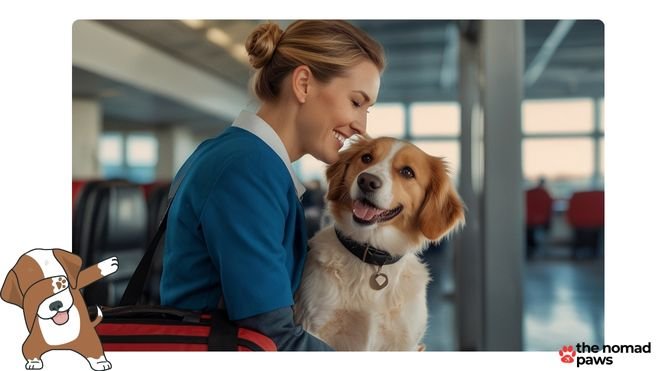
When it comes to international flights, the pet fee remains the same at $125 each way.
The only issue, here, is that things get a little less straightforward when it comes to international pet travel, as not all international destinations served by JetBlue allow pets.
If you are thinking about using JetBlue Airlines to travel with your pet internationally, reach out to their customer support to check the specific requirements for your destination before booking.
Keep in mind that some countries have strict quarantine laws or additional requirements for pet entry. These might incur extra costs beyond JetBlue’s pet fee, so factor these into your budget when planning an international trip with your pet.
Refund Policy
As mentioned earlier, JetBlue’s pet fee is non-refundable. This policy applies even if your travel plans change or if you’re unable to bring your pet for any reason. +
If your flight is canceled by JetBlue, however, you may be eligible for a refund of the pet fee along with your ticket.
Always check with JetBlue customer service for the most up-to-date information on refunds and cancellations.
Pet Reservation Requirements for JetBlue

Booking a flight with your pet on JetBlue requires some advance planning. Let’s break down the reservation process and what you need to know.
Booking Process
To book a flight with your pet on JetBlue, you need to follow these steps:
- Book your own ticket first
- Call JetBlue at least 24 hours before your flight to add your pet to the reservation
- Pay the pet fee at the time of booking your pet
Remember, you cannot book your pet online or through the JetBlue app. A phone call is necessary to ensure all details are correctly recorded and to confirm availability for your pet.
Time Restrictions
JetBlue requires that you book your pet at least 24 hours before your flight. However, it’s always better to book as early as possible.
JetBlue allows a limited number of pets per flight, so booking early increases your chances of securing a spot for your furry friend.
Also, keep in mind that JetBlue does not allow pets on overnight flights. If you’re planning a red-eye journey, you’ll need to make alternative arrangements for your pet.
Capacity Limitations
JetBlue has strict limits on the number of pets allowed per flight. Only six pets are allowed on each flight, and this is on a first-come, first-served basis. This is why early booking is crucial.
Additionally, each passenger is limited to one pet carrier. If you’re traveling with a companion, you could potentially bring two pets, each in their own carrier, but remember that each pet incurs a separate fee.
JetBlue Pet Carrier Guidelines
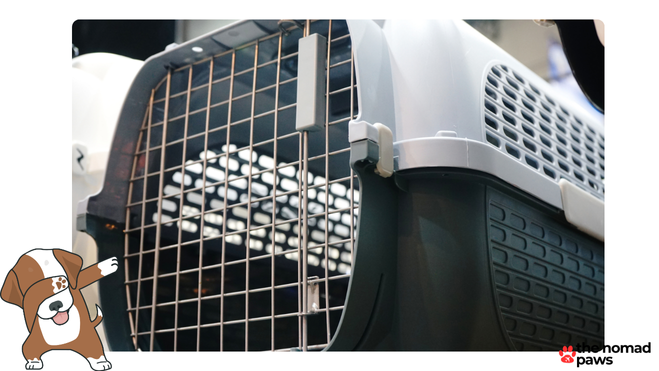
The right pet carrier is crucial for a comfortable and compliant journey on JetBlue. Let’s explore the airline’s requirements for pet carriers.
Approved Carrier Types
JetBlue requires that your pet travels in a carrier that is specifically designed for pet air travel. These carriers, should be well-ventilated, leak-proof, and secure. Both hard-sided (like the Petmate Sky kennel) and soft-sided carriers (like the 2Pet foldable dog crate) are acceptable, as long as they meet size requirements.
Some popular brands that make airline-approved pet carriers include Sherpa, Sleepypod, and Sturdi Products. Remember, the carrier you choose should be comfortable for your pet and easy for you to carry.
Size Requirements
The size of your pet carrier is obviously the most important requirement, as it must fit under the seat in front of you. JetBlue’s pet policy states that the maximum dimensions for pet carriers are:
- 17″ long x 12.5″ wide x 8.5″ high
These dimensions ensure that the carrier can fit comfortably under the seat without obstructing legroom or aisle space.
JetBlue Pet Breed Restrictions
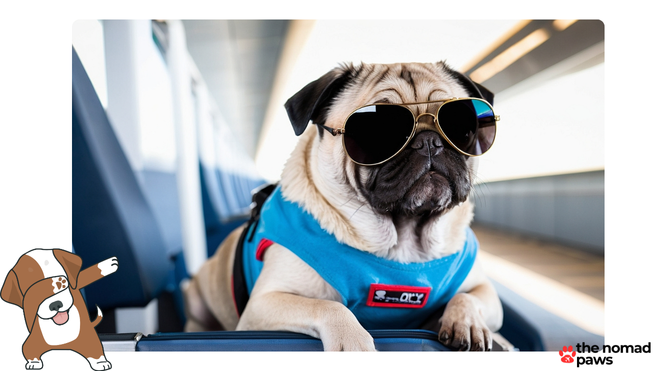
JetBlue does not have a specific list of prohibited dog breeds. However, they do have restrictions based on the size and weight of the dog. As mentioned earlier, the combined weight of your pet and carrier must not exceed 20 pounds.
This weight limit effectively excludes many larger dog breeds.
Additionally, brachycephalic or snub-nosed dog breeds may face additional scrutiny due to potential breathing issues at high altitudes.
While not explicitly banned, owners of these breeds should consult with their veterinarian before flying with a Frenchie or bringing a Pug with you on a plane.
Restricted Cat Breeds
Similar to dogs, JetBlue doesn’t publish a list of restricted cat breeds. However, the same weight and size restrictions apply. This means that larger cat breeds may not be eligible to fly in the cabin.
Again, brachycephalic cat breeds like Persians or Himalayans might face additional concerns due to potential breathing difficulties. If you own one of these breeds, it’s crucial to discuss air travel with your vet before booking a flight.
Exceptions and Special Considerations
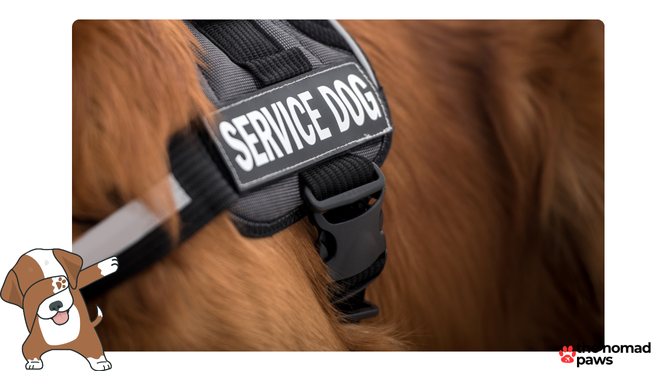
While JetBlue’s pet policy is generally strict, there are some exceptions and special considerations:
- Service animals are not subject to the same restrictions as pets. They are allowed in the cabin regardless of size or breed, provided they meet the Department of Transportation‘s definition of a service animal.
- Emotional support animals are no longer recognized as service animals by JetBlue and must travel as pets, subject to all pet policies.
If you have concerns about your pet’s eligibility to fly, it’s best to contact JetBlue directly. They can provide the most up-to-date information and help you determine if your pet can travel safely on their flights.
JetBlue International Pet Travel Policy
Traveling internationally with your pet on JetBlue requires additional planning and preparation.
When traveling internationally with your pet, you should know that each country has its own set of rules and regulations for pet entry.
JetBlue flies to several international destinations, and the requirements can vary significantly from one country to another.
For example:
- Some countries like Barbados require pets to have a microchip
- Others like Costa Rica may need a specific type of rabies vaccination
- Certain destinations might require a pet passport
- Bringing a dog to Australia comes with its own set of challenges (although we do have a guide that explains how to avoid pet quarantine in Australia)
It’s your responsibility as a pet owner to research and comply with the specific requirements of your destination country.
JetBlue recommends starting this process well in advance of your travel date, as some requirements may take weeks or even months to fulfill.
Quarantine Information
Some countries have mandatory quarantine periods for incoming pets. This is particularly common for island nations or countries with strict biosecurity measures.
If you’re traveling to a destination like Hawaii or New Zealand, your pet may be subject to a quarantine period upon arrival.
JetBlue doesn’t handle quarantine arrangements, so you’ll need to research and plan for this independently. Consider factors like:
- Length of quarantine
- Cost of quarantine facilities
- Visitation policies during quarantine
These quarantine requirements can significantly impact your travel plans, so it’s essential to factor them into your decision-making process when considering international travel with your pet.
Additional Documentation for International Travel
International pet travel often requires more extensive documentation than domestic travel. Some common documents you might need include:
- International Health Certificate: This must be issued by a USDA-accredited veterinarian and endorsed by the USDA or your state’s veterinary office.
- Proof of Rabies Vaccination: Many countries require this, and some have specific timing requirements for when the vaccination must be administered.
- Import Permits: Some countries require you to obtain a permit before bringing your pet into the country.
Remember, the shots that a dog needs to fly domestically might differ from international requirements. Always check with both JetBlue and your destination country’s embassy or consulate for the most accurate and up-to-date information.
Emotional Support Animals on JetBlue

The policy regarding emotional support animals (ESAs) on flights has undergone significant changes in recent years.
As of January 11, 2021, JetBlue no longer recognizes emotional support animals as service animals.
This change aligns with the U.S. Department of Transportation‘s revised Air Carrier Access Act (ACAA) regulation on the transportation of service animals by air.
Under the current policy, emotional support animals are treated as pets. This means they must comply with all of JetBlue’s pet travel requirements, including size restrictions, carrier requirements, and applicable fees.
While emotional support animals are now classified as pets, there are some key differences to be aware of:
- ESAs that exceed JetBlue’s pet size and weight limits cannot travel in the cabin, even if they were previously allowed as ESAs.
- Passengers traveling with former ESAs must now pay the standard pet fee.
- The limit of one pet per passenger applies to former ESAs as well.
JetBlue Pet Allowance per Passenger/Flight
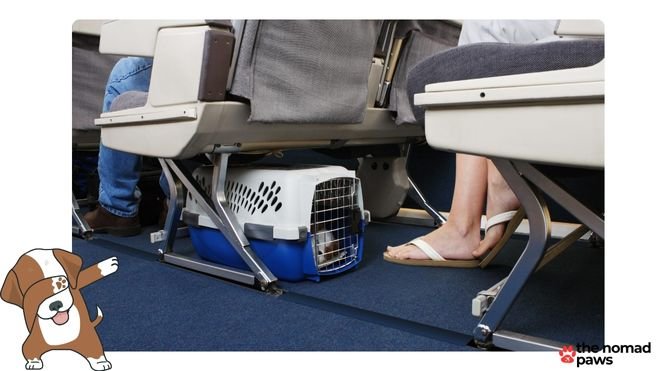
JetBlue’s pet policy allows one pet per passenger. This means that if you’re traveling alone, you can bring one pet with you in the cabin.
The pet must be in an approved carrier that fits under the seat in front of you.
It’s important to note that this limit applies regardless of the size of your pet or the type of ticket you’ve purchased.
Even if you’ve booked a first-class seat or multiple seats for yourself, you’re still limited to one pet.
In addition to the per-passenger limit, JetBlue also has a limit on the total number of pets allowed on each flight. Only six pets are allowed per flight on JetBlue aircraft.
This limit is crucial to keep in mind, especially if you’re traveling during peak seasons or on popular routes. The pet spots are allocated on a first-come, first-served basis, so it’s advisable to book your pet’s travel as early as possible to secure a spot.
Exceptions for Service Animals
While JetBlue’s pet policy is quite strict, there are exceptions for service animals.
Service animals, as defined by the Department of Transportation, are not subject to the same restrictions as pets. They don’t count towards the pet limit per flight and are not required to be in a carrier.
Remember, like the Southwest pet policy, each airline has its own specific rules. Always check the most current policy before booking your flight.
Required Pet Documentation for JetBlue Travel

For domestic travel within the United States, JetBlue does not typically require a health certificate for pets. However, some states may have their own requirements, so it’s always a good idea to check with both your origin and destination states.
For international travel, a health certificate is almost always required. This document, also known as a Veterinary Certificate, must be:
- Issued by a licensed veterinarian
- Dated within 10 days of your travel date
- Written in English or the language of your destination country
The health certificate should state that your pet is in good health and fit to travel.
Vaccination records are an essential part of pet travel documentation. While JetBlue doesn’t explicitly require vaccination records for domestic travel, it’s always a good idea to have them on hand.
For international travel, vaccination records are often mandatory. Many countries require proof of rabies vaccination, and some may have additional vaccination requirements. Make sure that your pet’s vaccinations are up-to-date and that you have the official records from your veterinarian.
Microchip Information
While not always required by JetBlue, having your pet microchipped is a good practice for safety and identification purposes.
Some international destinations mandate that pets be microchipped before entry. The microchip must meet ISO standards and be registered with your contact information.
Additional Documentation
Depending on your destination, additional documentation might be required. This could include:
- Parasite treatment proof
- Blood tests results (for diseases like rabies, especially in rabies-free countries)
- A pet passport (common in the European Union)
Signing Off: JetBlue and Pawsome Journeys
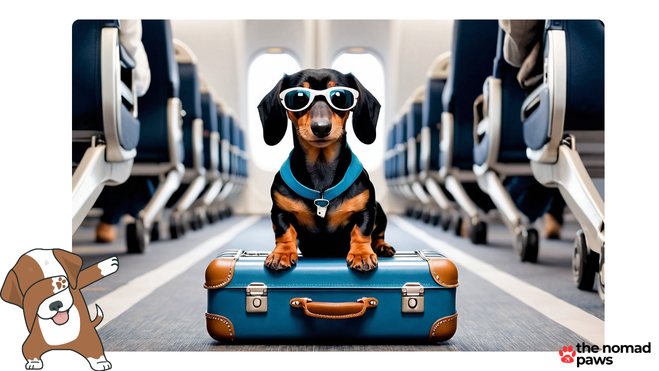
Flying with your pet on JetBlue can be easy if not even enjoyable… if you put in the hours and prepare the trip well.
Understanding the airline’s pet policies is key. Follow the rules for pet types, weight limits, carrier specifications, and gather all the necessary documentation.
Book early and keep your pet’s comfort and safety a priority. Follow the tips in this guide and your pet will be ready for your next JetBlue adventure. Safe travels!

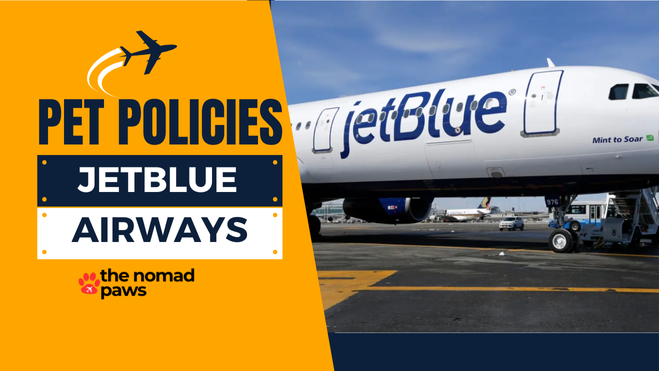






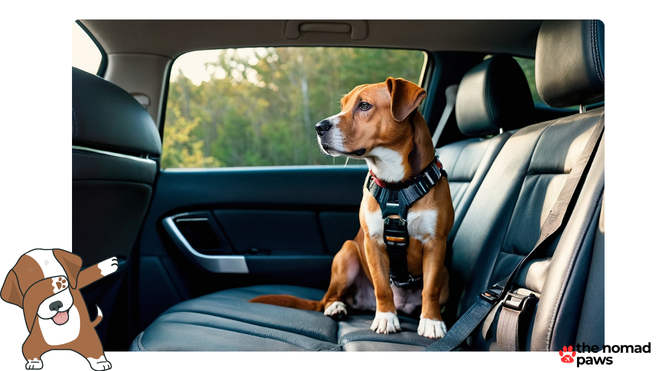
Is it ethical to bring your dog camping in the wilderness, considering the potential impact on local wildlife and ecosystems? How can pet owners ensure they are responsible campers while bringing their furry companions along for the adventure?
Thank you for your thoughtful question – although I believe you have posted it on the wrong page 🙂
Bringing a dog camping in the wilderness can be done ethically, but it does require pet owners to be mindful of their impact on the environment and wildlife. Here are a few ways to ensure responsible camping with a dog:
By being conscious of these factors, pet owners can enjoy camping with their dogs while minimizing their impact on the environment. It’s all about finding a balance between having fun and protecting nature.